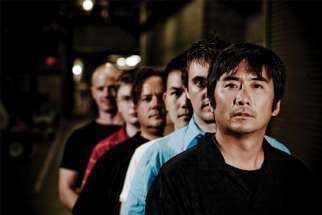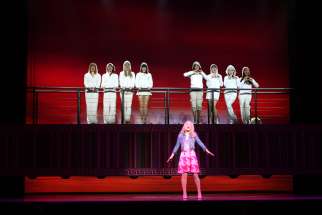Musical flips script, adds nuances of history
WASHINGTON -- Danny Schur, a Ukrainian Catholic from Winnipeg, thought he knew all about the 1919 general strike that brought life in his native city to a standstill.
Timely musical message on mental health
Most people have experienced that annoying friend who no matter how you try to shake them, they just won’t go away.
‘Superstar’ Forever
When Jesus Christ Superstar launched in 1970 — first with the concept album followed by the Broadway rock opera that opened in 1971, a production in London’s west end that would play for more than eight years and finally the 1973 movie — who knew it was the start of a phenomenon that still resonates almost half a century later.
Speaking Out: Finding Christ in my school musical
Cawthra Park Secondary School is currently preparing for a production of Legally Blonde The Musical where I play one of the lead characters, Vivienne Kensington. That means from Monday to Thursday after school and all-day every Sunday, we’ve been in rehearsals.
Joyful service takes on a reggae beat
A reworked Sister Act still packed with laughter
TORONTO - Sister Act, on stage at Toronto’s Ed Mirvish Theatre, will awaken your urge to boogie like it’s 1978.
In Philadelphia, we find wannabe star Deloris Van Cartier in thigh-high purple boots and a short leopard print dress. She’s just seen her married lover murder a man and now, under witness protection, the police have hidden her in the last place anyone would think to look — a convent.
Whoopi Goldberg, one of the musical’s producers, who first played Deloris on-screen, made Sister Act the film popular in 1992. And it is with this memory that many theatregoers walked into the performance. But with Ta’Rea Campbell as Deloris on stage, it’s easy to forget anyone else donned the black and white habit.
Campbell’s transformation from nightclub diva to divine singer was believable, while never losing the boisterous (in the best sense) personality of her character.
“She lacks a bit of self-control,” Campbell said about Deloris in an interview with The Catholic Register. “Not in a bad way. Just in a way that she only knows how to be one person and that’s herself. And sometimes, we as adults get to modify our behaviour when we’re in certain situations, and I don’t think Deloris Van Cartier is able to do that.”
It’s this freedom of spirit that comically conflicts with the convent’s Mother Superior, played by Hollis Resnik.
“I have to embody this very stern, rigid, pious nun,” said Resnik. “There’s a stoicism about her, there’s a strong belief system in her.”
An entire musical number is devoted to Mother Superior attempting to put Deloris in her place. Mother is traditional where Deloris likes change, stiff where Deloris is flexible, quiet where Deloris is loud and conservative where Deloris is anything but.
Though the characters are butting heads, the actors are in sync, finishing each other’s sentences during the interview.
“Deloris Van Cartier would like to take a bedazzler and bedazzle the habit if she could,” said Campbell. “Maybe I can jazz this outfit up a little bit,” she said mimicking her character’s attitude.
“It doesn’t cry out for accessories,” replied Resnik instantly in Mother Superior-mode.
The cast has great chemistry, but the music remains the main draw. If patrons expect songs from the movie, they will be slightly disappointed. Though productions such as this attract patrons who hope it will be a nostalgia-fest based on the film, the audience will still get value for their dollar because the show includes an original score by Alan Menken with lyrics by Glenn Slater. Hits such as “My God” from the film have been replaced with “Take Me To Heaven” where the nuns belt out cheeky lines, such as “I’ll take any vow, just take me now” and “I’ll get on my knees, just take me please.”
In “Sunday Morning Fever,” the sisters encourage the faithful to “shake it like you’re Mary Magdalene.”
Breakout musical performances also include Kinglsey Leggs as Curtis Jackson, Deloris’s mobster boyfriend, singing “When I Find My Baby.” Effortlessly switching from a sinister to a sweet tone, he promises to never let his baby go. Jackson’s clueless henchmen, played by Charles Barksdale, Todd A. Horman and Ernie Pruneda, also deliver a completely satisfying performance when they brainstorm via song ways to tempt the celibate nuns. In “Lady In The Long Black Dress” they promise to give the sisters something to confess.
Opening night was filled with plenty of laughs, including from the nuns in the audience. But there is a take home message in Deloris’s unexpected journey from sin to redemption, from loneliness to discovering the joy of sisterhood.
“Just be good to each other, no matter what the circumstances are,” said Resnik. “There’s always something to be learned and found in every relationship.”
No matter your religious beliefs, said Campbell, “It’s important to be good hearted, it’s important to respect other people, respect their journey, respect their path (and) respect their soul.” Amen, sister.
New musical Mass settings remain a work in progress
Sept. 25, 2011 marked the launch of the newly minted musical settings that followed the complete liturgical overhaul of the Roman missal.
In parishes around the archdiocese of Toronto, congregants were greeted with the small, floppy Celebrate in Song hymnal — a book that contains three freshly commissioned musical settings of the Mass. Much like the often overlapping of the spoken “and with your spirit” with the erstwhile “and also with you,” the musical settings presented congregants with a fresh challenge — adapting responses that had been previously learned en rote to a completely different, and sometimes complex, vocal line.
“I think that for people, change is death. Change is a metaphor for death. Nobody likes change,” said Peter Togni.
Togni is one of Canada’s most noted composers, and his choral works are heard in parishes across the world. Having set the Mass to music before, Togni provides an interesting view on the musical tradition that some congregants are still adapting to.
“I think the language that they’re using, in many cases, is more elegant and more directly translated from the original Latin, which goes back to what Paul VI really wanted,” said Togni.
“But, I understand the paradox, because in some ways there’s kind of a wooden link to Latin for some people — the sacrilization of Latin, almost, just for its own sake and I understand that this gets in the way of ecumenism for some people. But, from an artistic standpoint, setting the text to those words is in some ways easier and prettier, you know? ‘Lord, God of Hosts’ is easier than ‘Lord, God of Power and Might.’ I like that from a purely artistic standpoint.”
However, the adaptation, despite what may seem a more poetic version, hasn’t necessarily lent itself in all cases to the accompanying musical line. Thus, there lies an imperfect synthesis of text and music which is crucial to the participation of the congregants.
“One of them that I’ve heard, I find very awkward,” said Togni. “In the congregation that I go to now, the congregation doesn’t sing very much with one of the Mass parts because there’s so much for them to do that I find it’s overwhelming for them, and frankly, most people don’t sing.
“I think it’s the integration with the music and that text,” Togni said of what may be the inherent problem with the adjustment to the changes.
“I think different composers might have done different things with that text. Not that the text is perfect… you can get in sort of a dualistic all or nothing thinking — this is totally right, that’s totally wrong. I don’t think you can do that.”
Togni does note that the textual changes certainly serve to unite the Church across the country.
“You’re talking about universality, right? The beautiful thing about the new text, if we’re asked, is, for the French they always say ‘avec votre esprit.’ We now say, ‘and with your spirit,’ but the French have been saying it for years. So, it links us up with them,” said Togni.
Looking forward, Togni suggests that perhaps the music will adopt a more Gregorian tradition and create a solid chant-like structure that would accommodate and highlight the textual changes.
“Even if you read the Vatican documents, the chant is supposed to have lots of room. We had an opportunity to write an English setting that I think could have been more people friendly and more chant-like,” said Togni.
“No matter what you do to ‘people of goodwill,’ it’s hard to set. But, then, English is cumbersome anyway,” he laughs. “I get the sense that there’s something sort of artificial with what they ended up with.”
It’s not entirely unsuccessful, though. In particular, the Angeles “Agnus Dei” has been particularly well received by congregations that Togni’s witnessed, and musically well executed.
Despite that, perhaps the root of any musical problem in the liturgy lies with what could be described as a lagging musical culture in the Catholic tradition.
“Church choir attendance is getting smaller and smaller and smaller, in some places,” said Togni.
“In our culture, we’re not a singing people. We’re just not… I think we need to find a Mass setting that’s more people friendly, melodically; simpler rhythmically. Let’s face it — not many people sing any more.”
Another factor of the tradition that could be remedied is a less performance-like aspect to the melodic line, which would allow the cantor to interact more thoroughly with the congregants, some of whom may be averse to singing entirely, he said.
“In the Gloria, for example, I don’t know why there isn’t more refrain for the people and then the cantor or the choir can do the rest of it,” said Togni.
“It’s just so much easier. If you’re going to have the entire text, then you better make it singer friendly, and it’s not,” said Togni, who notes that some of the song selections in Celebrate in Song lend themselves well to congregant participation.
Hopefully, the new settings will entrench themselves in the musical tradition. That, or adapt to what the congregants need.
“What is that Latin phrase? ‘Lex orandi, Lex credendi’: the law of prayer is the law of belief — what we say in prayer expresses what we believe. That’s really the crux of it,” said Togni.
“It doesn’t sound like an entirely successful experiment, artistically, so far. Not yet.”








